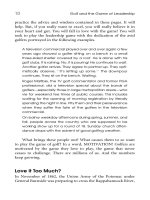Tài liệu Golf and the game of leadership 2 pdf
Bạn đang xem bản rút gọn của tài liệu. Xem và tải ngay bản đầy đủ của tài liệu tại đây (250.15 KB, 10 trang )
x
Acknowledgments
script. A tip of the golf cap to Niels for making the task a most
enjoyable one. My thanks as well to Mike Sivilli of AMACOM for
managing the overall editorial processes and book production.
And finally, special thanks to all who have contributed to my
leadership, and golfing, experiences.
.......................... 10589$ $ACK 02-23-04 16:44:05 PS
OnthePracticeTee
On August 10, 1994 at about 3:30 in the afternoon, I was driving
to Highland Meadows Golf Club in Sylvania, Ohio. Our then 20-
year-old son, Kevin Michael O’Toole McHugh, was with me.
Highland Meadows was not a new experience for either of us.
Kevin had played there many times, including in junior golf tour-
naments. His sisters, Kathy and Lisa, had both worked at the Club.
Kathy was the Club’soffice manager for several years and Lisa
worked in the dining room and the office while going to college.
Kevin was home for a few days prior to beginning his junior
year at the University of Michigan. He had just completed an
NROTC midshipman cruise on a guided missile destroyer out of
San Diego. This day he was interested in tuning up his well-above-
average golfing skills. As a freshman, Kevin was invited to try out
for Michigan’s golf team. He missed making the team by an aver-
age of less than one stroke over five 18-hole rounds!
Kevin was enthusiastic about the opportunity to play High-
land Meadows, an excellent course that annually hosts the LPGA’s
Jamie Farr Kroger Classic Tournament. I was along in the hope of
picking up some pointers that would improve my hacker status.
The conversation on the way caught me by surprise.
‘‘Dad,’’ says Kevin, ‘‘why don’t you write a book?’’
‘‘A book! About what?’’
‘‘You know, about that leadership stuff you’ve developed.
You really know a lot from your experiences and I think you
should write about them.’’
‘‘You’ve been talking to your mother!’’
1
.......................... 10589$ $TEE 02-23-04 16:44:06 PS
2
Golf and the Game of Leadership
‘‘No, really, I think you should write a book about leader-
ship.’’
Many people—family, friends, associates—can say ‘‘why
don’t you’’ . . . and they can be easily dismissed. But when your
youngest son, last in the line of six children, says, ‘‘write a book,
Dad,’’ eventually you just have to do it! Well, eventually is here!
So, you say, ‘‘Wait a minute, McHugh! What qualifies you to
write a book on leadership? Your son is probably biased, and
that’s nice, but how about sharing some of your leadership cre-
dentials.’’
That’s a fair request. I have been quite fortunate in that my
working career has afforded me the opportunity to serve as a
leader in a variety of organizations and at various levels of respon-
sibility. Let me highlight my experiences.
I have held executive positions in two major Fortune 100 cor-
porations, General Motors Corporation (GM) and Owens-Illinois
Incorporated (O-I). During my years at GM, I pursued a program
of personal development that resulted in a master’s degree from
Michigan State University and a Ph.D. from the Ohio State Uni-
versity. These credentials were critical to my later selection as
dean, continuing education, at the University of Toledo. And,
over a twenty-six-year military career, I’ve had the good fortune
to have my leadership contributions rewarded by advancement to
the rank of Captain USNR.
I believe now is the perfect time to write about leadership.
The country, the world, your loved ones, and mine, need leaders
as never before. So do our organizations. And, I submit, ‘‘real
leaders’’ are in short supply.
There are many books available that present theories of lead-
ership. These are accompanied by all manner of charts utilizing
geometric shapes, matrix pigeon holes, and lots of arrows, both
linear and circular. The qualities, personalities, and styles of suc-
cessful leaders, past and present, are listed. Persons of great power,
influence, or notoriety are placed under the microscope. I’ve de-
cided not to go any of these routes.
‘‘So,’’ I say to myself, ‘‘how can I write a book about leader-
.......................... 10589$ $TEE 02-23-04 16:44:06 PS
3
On the Practice Tee
ship that conveys what I believe are the pragmatic keys to being a
successful leader? And, how can I do it in an easily understood,
meaningful, helpful, and enjoyable way?’’ I’ve chosen to use the
game of golf.
If you play golf, you know the spellbinding influence it has on
its practitioners. For ‘‘real golfers’’ the game and all its subtleties
and vagaries grip the soul. Golf is a marvelous blend of tests of
skill and character, the quest for continuous improvement, mo-
ments of great exultation, and huge disappointment. It has its
own language, rules, customs, and etiquette, which are followed
religiously by those who prize the title ‘‘golfer.’’
If you are not a golfer, you need to make friends with one.
You’ll be introduced to a romantic game, which in its substance
and symbolism mirrors the lessons needed for the practice of ef-
fective leadership.
The ‘‘game of golf ’’ and the ‘‘game of leadership’’ metaphors
should come easily to those 27 million Americans, 1.8 million
Canadians, and other millions worldwide who play golf regularly.
Many more millions daily attempt to play the game of leadership.
Both games are played with widely, and wildly, ranging results.
Success at golf is exhilarating. Failure at the game is disappointing.
Success at leadership brings a sense of accomplishment. Failure at
leadership can be detrimental to the leader, harmful to followers
and disastrous for organizations, as illustrated, for example, by
Enron, Lucent, WorldCom, Corning, LTV, Rite-Aid, and others.
This book may make you more relaxed when you go golfing,
but it will not cause you to be a success on the golf course. If,
however, you take its simple lessons to heart and exercise perfect
practice of lessons you select, you’ll be a more effective leader—
what I call a ‘‘real leader’’—and perhaps even a ‘‘great leader.’’
You probably don’t determine your organization’s vision, val-
ues, and strategy. However, you are expected to have the necessary
technical skill and ability to manage your functional or profes-
sional area of responsibility in accordance with the established
vision, values, and strategy. These are givens that will not be ad-
dressed. What I will address are the expectations of you as a leader
of people, that is, how do you combine the efforts of others so
that your organization thrives and survives.
.......................... 10589$ $TEE 02-23-04 16:44:07 PS
4
Golf and the Game of Leadership
I facilitate a leadership development program for technical
people. The participants are mostly engineers. At the beginning of
the first day of the program, I ask, ‘‘Are there any engineers in the
room?’’ As you probably expect, most of the people raise their
hands. And, I say, ‘‘You must be in the wrong room, this is a
program for leaders.’’
No, I’ve never been thrown out of the room. The point is
made! Leadership is a different game. There is a difference be-
tween being an engineer with leadership concerns and being a
leader with an engineering background. We move on from there.
So, I ask that you see yourself as a person with technical or
professional skills and experiences that are not to be discarded.
They are important to you and your understanding of what needs
to be accomplished. But the job now is ‘‘the leadership of others’’
in the context of the organization’s vision, values, and strategy.
Therefore, my focus throughout this book is on you. We’ll look at
the attitudes, behaviors, and actions your followers, and others,
expect from you as leader.
Golf and leadership rest on similar foundations of fundamen-
tal concepts. Both are games for the individual. The golfer must
hit his or her own ball. The leader must decide the next move.
Consequently, each must accept the responsibility for the results.
This book is meant for you, the leadership tournament player,
the organizational leader on the front line working to make things
happen. It is you who must do the right things, in the right way,
if goals are to be achieved. You’ve probably not been anointed,
didn’t marry the chairman’s son or daughter, and weren’t born
with a silver putter in your hand! You are simply a hard-working
person, with sleeves rolled up, dedicated to being the best leader
you can be, and beyond that let the putts drop where they may.
Though the ‘‘top of the organization hitters’’ are not the pri-
mary focus for this book, I do invite them to join us as we play
the round. After all, you need their support and example if you
are to be the very best leader you can be. They should be aware of
what we are talking about.
In writing about Inspector Thomas Lynley, principal charac-
ter in her mystery novel For the Sake of Elena, Elizabeth George
muses: ‘‘Having not read university writing in years, Lynley smiled
.......................... 10589$ $TEE 02-23-04 16:44:07 PS









